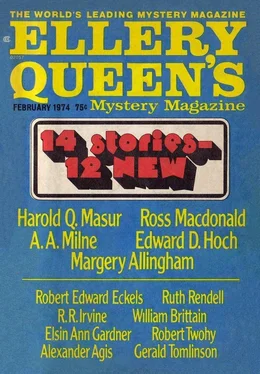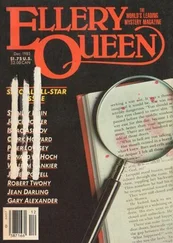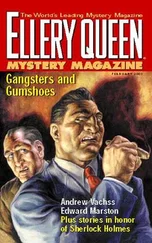Alexander Agis - Ellery Queen’s Mystery Magazine, Vol. 63, No. 2. Whole No. 363, February 1974
Здесь есть возможность читать онлайн «Alexander Agis - Ellery Queen’s Mystery Magazine, Vol. 63, No. 2. Whole No. 363, February 1974» весь текст электронной книги совершенно бесплатно (целиком полную версию без сокращений). В некоторых случаях можно слушать аудио, скачать через торрент в формате fb2 и присутствует краткое содержание. Город: New York, Год выпуска: 1974, Издательство: Davis Publications, Жанр: Классический детектив, на английском языке. Описание произведения, (предисловие) а так же отзывы посетителей доступны на портале библиотеки ЛибКат.
- Название:Ellery Queen’s Mystery Magazine, Vol. 63, No. 2. Whole No. 363, February 1974
- Автор:
- Издательство:Davis Publications
- Жанр:
- Год:1974
- Город:New York
- ISBN:нет данных
- Рейтинг книги:4 / 5. Голосов: 1
-
Избранное:Добавить в избранное
- Отзывы:
-
Ваша оценка:
- 80
- 1
- 2
- 3
- 4
- 5
Ellery Queen’s Mystery Magazine, Vol. 63, No. 2. Whole No. 363, February 1974: краткое содержание, описание и аннотация
Предлагаем к чтению аннотацию, описание, краткое содержание или предисловие (зависит от того, что написал сам автор книги «Ellery Queen’s Mystery Magazine, Vol. 63, No. 2. Whole No. 363, February 1974»). Если вы не нашли необходимую информацию о книге — напишите в комментариях, мы постараемся отыскать её.
Ellery Queen’s Mystery Magazine, Vol. 63, No. 2. Whole No. 363, February 1974 — читать онлайн бесплатно полную книгу (весь текст) целиком
Ниже представлен текст книги, разбитый по страницам. Система сохранения места последней прочитанной страницы, позволяет с удобством читать онлайн бесплатно книгу «Ellery Queen’s Mystery Magazine, Vol. 63, No. 2. Whole No. 363, February 1974», без необходимости каждый раз заново искать на чём Вы остановились. Поставьте закладку, и сможете в любой момент перейти на страницу, на которой закончили чтение.
Интервал:
Закладка:
“In the market. It was pretty and I needed a shawl.”
He felt his face swell with an onrush of blood. “To be more fitting for your low lover, I daresay? You need not explain why you absent yourself from my household, for I know why. You have assignations in that garden, do you not, with your paramours? With my young coachman and that scribbler fellow Sarson?”
“It is not true,” she whispered.
“Do you give me the lie, Isabella? Do you know that I could have a Bill of Divorcement passed in Parliament and rid myself of you? I could keep all your fortune and send you back to your papa at Cranstock.”
She came to him and fell on her knees. “Before God, Mr. Hewson, I am your honest wife! I have never betrayed you. Don’t send me away, oh, don’t!”
“Get up.” She was clinging to him and he pushed her away. “You have disgraced yourself and me. You have committed the worst sin a woman can commit, you have neglected your duties and brought me into disrepute before my friends.” She crept from him, leaving a trail of water drops on the carpet. “I shall think now what I must do,” he said. “I want no scandal, mind. Perhaps it will be best if I remove you from this.”
“Do not take me from my garden!”
“You are a married woman, Isabella, and have no rights. Pray remember it. What you wish does not signify. I am thinking of my reputation in society. Yes, to take you away may be best. Go now and get some rest. I will sleep in my dressing-room and we will tell the servants you are ill so that there may be no gossip. Come, do as I bid you.”
She gathered up her wet coat and left the room, crying quietly. The lamp in the square had gone out. He searched for a candle to light him to bed but he could not find one.
Philip Sarson came into the porters’ office to collect his morning paper. “A bit brighter today,” he said.
“We can do with it, sir, after that rain.”
“Mrs. Gilmour not out in the garden this morning?”
“They’ve gone away, sir. Didn’t you know?”
“I haven’t seen so much of them lately,” said Philip. “Gone away for Christmas, d’you mean?”
“I couldn’t say. Seven A.M., they went. I’d only just come on duty.” The head porter looked disapproving. “Mr. Gilmour said she was ill but she could walk all right. Tried to get into the garden, she did, only he’d taken the key away from her. She got hold of the gate and he pulled her off very roughlike, I thought. It’s not the sort of thing you expect in this class of property.”
“Where have they gone? Do you know?”
“They took his car. Italy, I think he said. Yes, it was. I saw Naples on their luggage labels. Are you all right, sir? All of a sudden you look quite ill.”
Philip made no reply. He walked down the steps, across the square, and looked through the railings into the garden. A small white glove, sodden and flat as a wet leaf, lay on the seat. He shivered, cursing the writer’s imagination that led him into such strange and improbable fancies.
Nobody Can Win ’Em All
by Robert Edward Eckels [13] © 1973 by Robert Edward Eckels.
A deep-chuckle con-man story that would have delighted O. Henry, and, yes, Mark Twain — and who among devotees of the big con can resist that? Here is the very essence of “con” — in its pure and pristine form — involving the Game That Won the West and a marvelous “moment of truth”... Mr. Eckels, give us more exploits of Major Henry T. McDonlevy and his ingenious shenanigans...
The small round-faced girl at the receptionist’s desk just outside the railing that separated the executive offices from the rest of the bank looked up and gave me a bright professional smile. “Yes?” she said.
“My name is Thomas James,” I said. “I’m supposed to meet a friend of mine here. A Major McDonlevy.”
The girl’s smile faded. “I don’t believe—” she began dubiously.
I held my hand shoulder high: “Short,” I said. “About five five and built something like a barrel on two legs.”
“Oh,” she said, the smile back in place, “that would be the gentleman with Mr. Andrews, Junior. Just a moment while I buzz them.”
She picked up her phone with one hand and simultaneously dialed a three-digit number with the other; in a moment she spoke softly into the receiver, then set it back in its place as smoothly as she had picked it up. “You’re to go right in,” she said. “Third office on your left.”
I gave her a smile and a wink for thanks and pushed through the swinging gate into officers’ country. The entire rear wall was lined with office doors, but even without the girl’s directions I would have had no difficulty locating Andrews, Junior’s, because his door was one of three that had names printed on them in neat gilt letters. I rapped once, then went on in without waiting for a response.
They both looked up as I came in and the Major rose automatically in greeting. And after a hesitation Andrews rose too. He was a tall man with thinning fair hair, a pale undistinguished blur of a face and, in his late thirties or early forties, relatively young to be such a high-ranking bank executive — although the fact that one of those other lettered doors had borne the name Andrews, Senior may have had something to do with it.
“Ah, there you are, my boy,” the Major said heartily. “Sorry to have gone off without you like that. But you know how it is with time and tide, and I see you got my message all right.”
“Yes,” I said.
“In your absence,” the Major went on, “I took the liberty of going ahead and discussing with Mr. Andrews our interest in the old Easdale Shoe building.”
“I see,” I said. “And what decision did you come to?”
“Well, of course I haven’t committed us to anything,” the Major said. “But the property does sound extremely promising, and since Mr. Andrews has consented to drive us, I suggest we run out and take a good look at the place and then see if we can’t come to a decision.”
“Fine with me,” I said. “I wouldn’t want to inconvenience Mr. Andrews, though.”
“No problem,” Andrews said in a voice that tried for a hail-fellow-well-met heartiness. “Thursday afternoons are always slow. But I’d be glad to do it at any time.”
I imagined he would. Because it wasn’t every day that someone showed up to express an interest in acquiring a building that had lain idle since the previous owner had defaulted on his mortgage six years before. But rather than bring that up, I just smiled and said, “Offer accepted then.”
“Good,” Andrews said. He moved around from behind his desk. “If you’ll just follow me,” he said. “My car’s right out back.”
Andrews wasn’t a fast driver. But he was a frightening one, given to swiveling his head and eyes away from the road as he talked in an attempt to include all his passengers in his conversation. As a result, he almost didn’t see the gray coupe pulled off onto the narrow shoulder until it was almost too late. But his head jerked back as the Major and I cried out a warning in near unison, and he managed to swing the wheel away just in time to avoid a hard sideswipe.
“Damn fool,” Andrews grumbled. “What’s he doing parked out on the highway?”
“I think you’d better stop,” the Major said.
“Why?” Andrews said, alarmed. “I didn’t hit him, did I?”
“No,” the Major said calmly. “But he is a young lady, and she looks as if she were in distress.”
“Oh,” Andrews said. “Oh.” He didn’t look particularly happy about it, but he did pull over to the shoulder. As soon as he stopped, I got out and walked back to where a slim girl with long blonde hair framing a round, almost doll-like face stood beside the coupe.
Читать дальшеИнтервал:
Закладка:
Похожие книги на «Ellery Queen’s Mystery Magazine, Vol. 63, No. 2. Whole No. 363, February 1974»
Представляем Вашему вниманию похожие книги на «Ellery Queen’s Mystery Magazine, Vol. 63, No. 2. Whole No. 363, February 1974» списком для выбора. Мы отобрали схожую по названию и смыслу литературу в надежде предоставить читателям больше вариантов отыскать новые, интересные, ещё непрочитанные произведения.
Обсуждение, отзывы о книге «Ellery Queen’s Mystery Magazine, Vol. 63, No. 2. Whole No. 363, February 1974» и просто собственные мнения читателей. Оставьте ваши комментарии, напишите, что Вы думаете о произведении, его смысле или главных героях. Укажите что конкретно понравилось, а что нет, и почему Вы так считаете.












